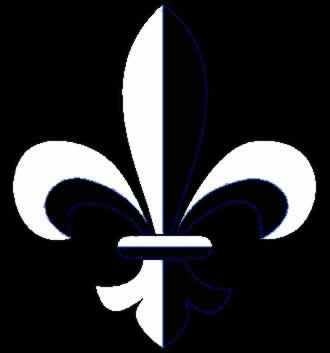Louis Armstrong
is probably the most famous jazz musician that New Orleans
ever produced.
He grew up in the same neighborhood as Mary
Fritz, a young woman who worked for my mother-in-law. It was
a really rough neighborhood and they called it "the bloody
bucket."
Mary said people would sit on the front stop
of the house, on the banquette, on Mardi Gras morning, watching
the young people in the costumes, then somebody would yell
"The Indians are coming!" and they would all run
inside and bolt the doors.
The "Indians"
were the African-American men who wore truly magnificent costumes
of satin, beads and feathers. Everyone loved to see them,
but by midmorning they were usually pretty well boozed up
and aggressive, and the women didn't want to be around until
the "Indians had passed by. I am sure those women must
have been peeking through the "jalousies" (shutters)
on their doors and windows while they passed.
Knowing that
background it was probably understandable that Louis got picked
up for firing a revolver on New Year's Day. His grandmother
was raising him and couldn't cope with that. Louis was sent
to a boy's home called The Waif's Home, which was the best
thing that ever happened to him.
He was able
to have a cornet and to get some rudimentary instruction.
He once said they had first given him a bugle and there was
a little hole in the horn which made him blow hard, so he
was always loud.
When he finally
got a cornet (from Joe "King" Oliver), he could
make a really big sound. After he could make it on his own,
he gave a cornet to the school to someone else could use it.
Most of the jazz musicians got their start in Storyville and
so did Louis. He developed a solo style which was unique,
and was lucky enough to work with "King" Oliver
and "Kid" Ory. He played in both their bands at
different times, and finally got his own band. His most famous
song became "Hello Dolly."
Louis, called
"Satchmo" for his big mouth (satchel mouth), was
one of the earliest jazz musicians to produce a solo recording.
He literally pulled jazz out of the amateur class of street
corner players and introduced a new kind of inventive, improvisational
music that was unique and powerful.
In addition to playing
trumpet in a way few could match, he had a gravelly voice
that was definitely unique. This double gift made for a winning
combination that pleased audiences. He was always more of
a genius than the average person realized, and he was a loveable
clown.
Louis Armstrong
was invited to be King Zulu one year, an integral part of
Mardi Gras in New Orleans. The parade was the traditional
African component of the whole celebration. We always went
to see Zulu's arrival as he came in on a yacht bedecked with
all the colored streamers and banners a boat could carry.
Added to the decorations were many symbols of African heritage
and culture.
The Jahnke Company loaned them a couple of their
barges, and they too were decorated for the occasion and carried
the members of Zulu's court. The boats steamed up the New
Basin Canal into the heart of the city.
